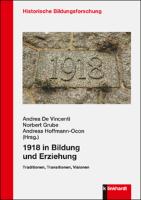1918 in Bildung und Erziehung
Traditionen, Transitionen, Visionen
Contributor(s)
De Vincenti, Andrea (editor)
Grube, Norbert (editor)
Hoffmann-Ocon, Andreas (editor)
Language
GermanAbstract
"1918" signifies more than the end of the First World War. The reference to the year often also justifies narratives in the history of education. On the other hand, this volume explores the simultaneities of caesurae and traditions, ruptures and continuities in regional, national, European and global perspectives. It examines diverse paradoxes of supposedly old and new pedagogical cultures and practices as well as ambivalences of youth between rebellion and attachment to educational ideals. It also focuses on the questioning of schools and pedagogy, their relegitimisation and the intertwining of social democracy and socialism with educational reforms and traditions. In this way, the volume aims at the often described "clash of ideologies" in the interwar period and at the circulation of competing knowledge, so that it discusses the complex openness of 1918 in terms of educational history. „1918“ bezeichnet mehr als das Ende des Ersten Weltkriegs. Der Jahresbezug begründet häufig auch bildungsgeschichtliche Narrative. Hingegen fragt der Band nach Gleichzeitigkeiten von Zäsuren und Tradierungen, Brüchen und Kontinuitäten in regionalen, nationalen, europäischen und globalen Perspektiven. Er untersucht vielfältige Paradoxien vermeintlich alter und neuer pädagogischer Kulturen und Praktiken ebenso wie Ambivalenzen der Jugend zwischen Aufbegehren und Anknüpfung an Bildungsideale. Auch die Infragestellung von Schule und Pädagogik, ihre Relegitimierung sowie die Verflechtung von Sozialdemokratie und Sozialismus mit Bildungsreformen und -traditionen werden fokussiert. Damit zielt der Band auf den vielfach beschriebenen «Kampf der Ideologien» in der Zwischenkriegszeit und auf die Zirkulation konkurrierender Wissen, sodass er bildungshistorisch die komplexe Offenheit von 1918 diskutiert.
Keywords
Historische Bildungsforschung; Bildungsgeschichte; Geschichte <Histor>; Schule; Jugend; Schülermitwirkung; Lehrerseminar; Mitbestimmung; Reformpädagogik; Jugendbewegung; Kritik; Schülerbewegung; Aufstand; Elternmitwirkung; Nachkriegsgeschichte; Zwischenkriegszeit; Weltkrieg I; Schülerorganisation; Kollektives Gedächtnis; Turnverein; Körpererziehung; Männlichkeit; Patriotismus; Persönlichkeitsbildung; Körperkultur; Leitbild; Körperbild; Geschlecht; Geschlechtsspezifische Sozialisation; Geschlechtergeschichte; Turnen; Jugendkultur; Orientalistik; Interesse; Indienbild; Rezeption; Lehrerfortbildung; Organisation; Politische Kultur; Volksschule; Selbstwahrnehmung; Bildungspolitik; Praxeologie; Lehrer; Neuorientierung; Pädagogik; Reform; Gesellschaft; Positivismus; Evolutionismus; Experimentelle Pädagogik; Kinderpsychologie; Steuerung; Schulbuch; Analyse; Vergleich; Evangelischer Religionsunterricht; Religionsunterricht; Schulbuchforschung; Lebenskunde; Mittelschule; Lehrmittel; Erziehung; Lehrplan; Lehrplanvergleich; Curriculum; Kirche-Staat-Beziehung; Schulsystem; Sozialdemokrat; Schriftsteller; Sozialist; Pädagoge; Historische Persönlichkeit; Pädagogisierung; Biografie; Autobiografie; Linke <Pol>; Bildung; Arbeiterbildung; Arbeiterbewegung; Arbeiterklasse; Sozialistische Bildung; Außerschulischer Lernort; Erwachsenenbildung; Politisches Programm; Erziehungsprogramm; Sozialdemokratie; Schulreform; Bildungsreform; Sozialismus; Sozialgeschichte; Kulturgeschichte; Bildungszugang; Schulgemeinde; Quellenkritik; Historische Quelle; Tagore; Rabindranath; Thorndike; Edward L.; Dewey; John; Traber; Alfred; Glöckel; Otto; Bernfeld; Siegfried; 20. Jahrhundert; Zürich; Schweiz; Deutschland; Indien; Deutschland <bis 1945>; Tschechische Republik; Tschechoslowakei; USA; Weimarer Republik; Preußen; Preußische Reform; Deutsches Reich; Wien; Österreich; History of education; History of educational activities; History; School; Adolescence; Youth; Pupil Participation; Teachers' training college; Codetermination; Progressive Education; Progressive education; Reform pedagogics; Youth movement; Criticism; Revolt; Parent participation; Post-war period; Peace time; World War I; Student organizations; Physical education; Masculinity; Patriotism; Personality development; Ideal (model); Body image; Sex; Gender-specific socialization; Gymnastics; Youth culture; Reception; Further education for teachers; Further education of teachers; Further training for teachers; Organization; Political culture; Elementary School; General compulsory school; Primary school; Self-perception; Educational policy; Teacher; Pedagogics; Sciences of education; Society; Positivism; Experimental education; Experimental pedagogics; Experimental teaching; Child psychology; Children's hospital; Text book; Textbook; Religious instruction; Teaching of religion; Textbook research; Intermediate school; Educational Materials; Teaching aids; Training aid; Education; State church separation; School system; Pedagogue; Biographies; Autobiographies; Education of workers; Workers' education; Labor movement; Working Class; Adult education; Adult training; Political program; Social democracy; School reform; Educational reform; Socialism; Social history; Cultural history; Access to Education; School community; Zurich; Switzerland; Germany; India; Czech Republic; Czechoslovakia; Weimar Republic; Weimar Republic (Germany; 1918-33); German Reich; Vienna; AustriaDOI
10.35468/5827ISBN
9783781523951, 9783781558274, 9783781523951Publisher
Verlag Julius KlinkhardtPublication date and place
Bad Heilbrunn, 2020Grantor
Series
Historische Bildungsforschung. Tagungsbände der Sektion Historische Bildungsforschung,Classification
History of education


 Download
Download Web Shop
Web Shop